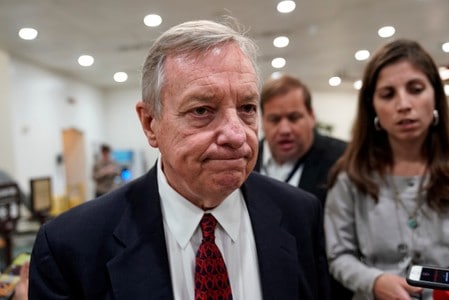By Bryan Pietsch and Richard Cowan
WASHINGTON (Reuters) – A bipartisan group of U.S. lawmakers said on Thursday they are forming a caucus to combat the “epidemic” of youth vaping, as cases of lung illness tied to vaping have risen and President Donald Trump has pushed for a ban on flavored e-cigarettes.
Officials have previously warned that sweet flavors had drawn millions of children into nicotine addiction. “We must ban flavors in a comprehensive manner,” said U.S. Representative Raja Krishnamoorthi, a Democrat co-leading the new Congressional Caucus to End the Youth Vaping Epidemic, along with Republican Representative Peter King and Democratic Senator Dick Durbin.
The lawmakers cited health experts who say flavors like mango and mint from popular e-cigarette companies like Juul Labs Inc have caused the surge in youth vaping.
Krishnamoorthi, chairman of the House Oversight Subcommittee on Economic and Consumer Policy, said Congress needs to “craft legislative solutions” to curb use of vaping products by teens.
Juul did not immediately respond to a request for comment. Juul has insisted that it “never marketed to youth, period,” and that it supports the need for “aggressive category-wide action on flavored products.” The company pulled many of its flavors from retail shelves last year but kept menthol and mint, which remains one of its most popular flavors.
Also on Thursday, Durbin and a handful of other Democratic senators announced a bill to tax e-cigarettes and increase the tobacco tax rate. Durbin said in a statement the bill would be the first to tax e-cigarettes at the federal level, and the first tax increase on tobacco in a decade.
Representative Rosa DeLauro, the Democratic chair of the committee that oversees appropriations for the U.S. Department of Health and Human Services, said on Thursday her committee will hold a hearing, possibly to push HHS to regulate vaping.
HHS Secretary Alex Azar said last week his department would move, under Trump’s direction, to ban all e-cigarette flavors other than tobacco in an effort to curb the use of e-cigarettes by youth.
Thursday’s announcements came the same day U.S. health officials said they are now investigating 530 confirmed and probable cases of severe lung illnesses and seven deaths tied to vaping, and working to identify the cause of the outbreak. No single substance or compound, including tetrahydrocannabinol (THC), the high-inducing component of marijuana, or Vitamin E acetate, has been linked to all of the cases so far.
(Reporting by Bryan Pietsch and Richard Cowan in Washington; Editing by Vanessa O’Connell and Matthew Lewis)


